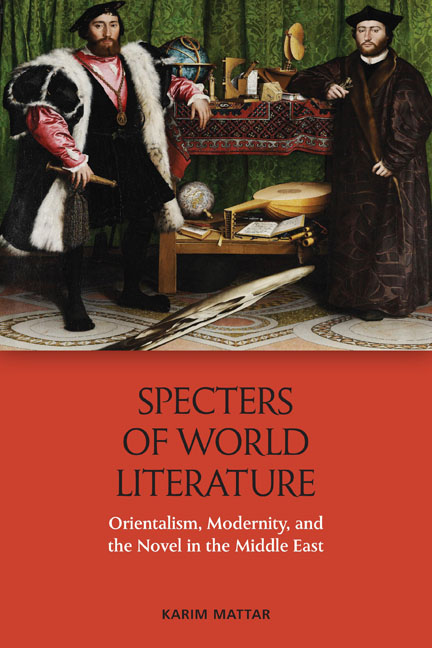Book contents
- Frontmatter
- Contents
- Preface
- Acknowledgments
- Note on Transliterations
- Introduction: Towards a Spectral Theory of World Literature
- I The Worlding of “Literature” in the Middle East
- II The Middle Eastern Novel and the Spectral Life-World of Modernity
- Conclusion: Futures of Spectrality
- Bibliography
- Index
2 - A Genealogy of Adab in the Comparative Middle East
Published online by Cambridge University Press: 20 October 2020
- Frontmatter
- Contents
- Preface
- Acknowledgments
- Note on Transliterations
- Introduction: Towards a Spectral Theory of World Literature
- I The Worlding of “Literature” in the Middle East
- II The Middle Eastern Novel and the Spectral Life-World of Modernity
- Conclusion: Futures of Spectrality
- Bibliography
- Index
Summary
[W]e are the guests of language.
Abdelfattah Kilito, Thou Shalt Not Speak My LanguageThis book of mine to the sophisticate will be sophisticated And smooth-tongued, while to the foolish it will be foolish.
Ahmad Faris al-Shidyaq, Leg over LegIn the contemporary Middle East, the range of terms used to designate “literature”—“adab” (the Arab world), “edebiyat” (Turkey), and “adabiyā t” (Iran), among others—bear a striking resemblance. Indeed, they share a common linguistic root, the Arabic word “adab” (أدب). Etymologically speaking, this word harbored a number of distinct but overlapping connotations in the classical to medieval Arabic-Islamic life-world. Broadly, it referred to the highly esteemed virtues of propriety, custom, etiquette, courtesy, civility, decency, discipline, refinement, urbanity, education, and so forth of that historical and geographical terrain (i.e., as rooted in Arab sociocultural traditions and undergirded by Islamic precepts), and to a specified field of literary and cultural practice by which these values were expressed and reproduced. Today, however, adab and its Turkish and Iranian correlates signify something quite different. They now refer directly and specifically to the modern, European concept of “literature” discussed in the Introduction to this book, and encompass, act as the conceptual grounds for the modern literary forms—the novel, the lyric poem, and the stage play—associated with the latter as these have become ascendant in the national and regional cultures of the Middle East. How did this transformation in the meaning of adab and its variants come about? In their current definition and usage across the Arab world, Turkey, and Iran, what are their origins, how were they constituted, what ideological content do they carry, and what functions do they serve? How do they relate to the wider trajectory of modernity in the region?
In this chapter, I trace a genealogy of adab's reinscription as literature in the Middle East. I argue that in their contemporary deployment, the terms adab, edebiyat, and adabiyā t alike are all premised on the concerted efforts undertaken by elite scholars, intellectuals, and writers in their respective national contexts to modernize and develop their literary and cultural spheres in the nineteenth to the mid-twentieth centuries.
- Type
- Chapter
- Information
- Specters of World LiteratureOrientalism, Modernity, and the Novel in the Middle East, pp. 110 - 174Publisher: Edinburgh University PressPrint publication year: 2020



